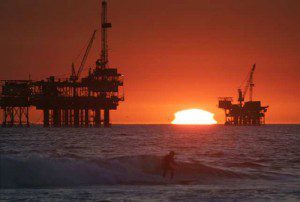
A Tampa Democrat has filed a Senate version of a proposed constitutional amendment to ban oil drilling within about 10 miles of Florida’s coastline.
The proposed amendment (SJR 90), filed Tuesday by Sen. Arthenia Joyner, matches a House version (HJR 23) filed earlier this year by Rep. Rick Kriseman, D-St. Petersburg. It would ask voters to put into the constitution a ban on exploration, drilling, extraction or production of oil in Florida waters.
“There are people still suffering from the big spill,” Joyner said Wednesday. “Do you want to expose Florida to the possibility of another spill – but closer to our shore? I just can’t believe people want to bring it that close, after seeing what happens when it’s farther out.
“To open up our shoreline to the possibility of oil is ludicrous,” Joyner said.
The move, which would need three-fifths approval of both chambers to get the proposal before voters, comes as backers of drilling have begun again raising the prospect of new exploration for both oil and gas to combat high energy prices, as well as and reducing American dependence on foreign sources of energy.
Just over a year after the BP Deepwater Horizon spill, largest oil spill in the history of the United States, Joyner said the push for drilling is regaining strength. She pointed to suggestion this week by Republican presidential candidate Michelle Bachmann to consider new drilling in the eastern Gulf and, possibly in the Everglades, if it can be done safely. When Bachmann brought it up at a South Florida campaign stop, she was greeted by calls of “Drill Baby, Drill.”
“It seems like we need it now more than ever,” Joyner said of a constitutional ban.
Senate President Mike Haridopolos has said he has no intention of pushing for new drilling in Florida waters this year. Haridopolos, R-Merritt Island, was a backer of a bill in 2010 that would have removed a moratorium on drilling in Florida waters, but changed his stance after the BP oil spill began in April of that year. Since then, Haridopolos has said there is a need for new drilling in American waters, but has given assurances that Florida waters – which extend about 10 miles in the Gulf, and closer in the Atlantic – would remain off the agenda in the coming year.
The moratorium on drilling in Florida waters remains, but nothing would prevent lawmakers from lifting it, which is the impetus for the proposed constitutional ban. Then-Gov. Charlie Crist proposed such a ban in the wake of the spill, but the House refused to take it up.
Crist is now, along with former Democratic gubernatorial candidate Alex Sink, a backer of another push to get the idea before voters, a citizen initiative being pushed by a group called Save Our Seas, Beaches and Shores.
That group is collecting signatures to try to get the issue on the ballot. Its leader, Manley Fuller, conceded Wednesday that it doesn’t look like the grassroots group, which relies heavily on volunteers, will be able to hit its mark in time for the 2012 ballot.
“It would be extremely difficult, practically speaking, for us to make the ballot,” Fuller said. “It’s been a mom and pop operation. We’re looking for a major supporter, a major benefactor. We need some people to write some checks.
“It would be great if the Legislature would put it on the ballot,” Fuller said. “That would be wonderful.”
Gov. Rick Scott, who wouldn’t have a say because proposed amendments passed by lawmakers go straight to the ballot without the governor’s approval, has recently said he supports additional drilling if it can be shown there’s no chance of a major spill, but he hasn’t been convinced of that yet.
Opponents of drilling fear the debate over whether to allow it in Florida waters goes beyond the actual question of whether to let new exploration begin in the area. They point to an acknowledgement last year by North Dakota Sen. Byron Dorgan, a Republican backer of drilling, that the issue is in part about trying to expand drilling farther out in the Gulf, in federal waters.
Opposition to drilling in federal waters over environmental concerns would carry less weight, Dorgan has said, if Florida lawmakers were to approve drilling even closer to shore.
Another question remains how much oil and gas would be produced by new drilling. In the 1970s and ’80s, about 40 exploratory wells were drilled in the Gulf from Pensacola to Tampa Bay. Little oil was produced, and what was found was a low-grade crude – but the drilling did find large reserves of natural gas.
Backers of drilling generally have said that in the wake of the BP spill last year, the likelihood of another similar spill is greatly reduced. The Obama administration, which backs new drilling in federal waters in parts of the Gulf, said that just last week, when it approved the sale of new oil and gas leases in the Gulf.
“Since Deepwater Horizon, we have strengthened oversight at every stage of the oil and gas development process, including deepwater drilling safety, subsea blowout containment, and spill response capability,” Interior Secretary Ken Salazar said last week. Those leases, however, will be in the western Gulf, nearer Louisiana.
Joyner said the argument is different for Florida, where beaches are so important to the economy.
“Florida is a natural tourist attraction – why would you do something that has the potential of decimating something people come from all over the world for, it’s beautiful beaches?”
By David Royse


